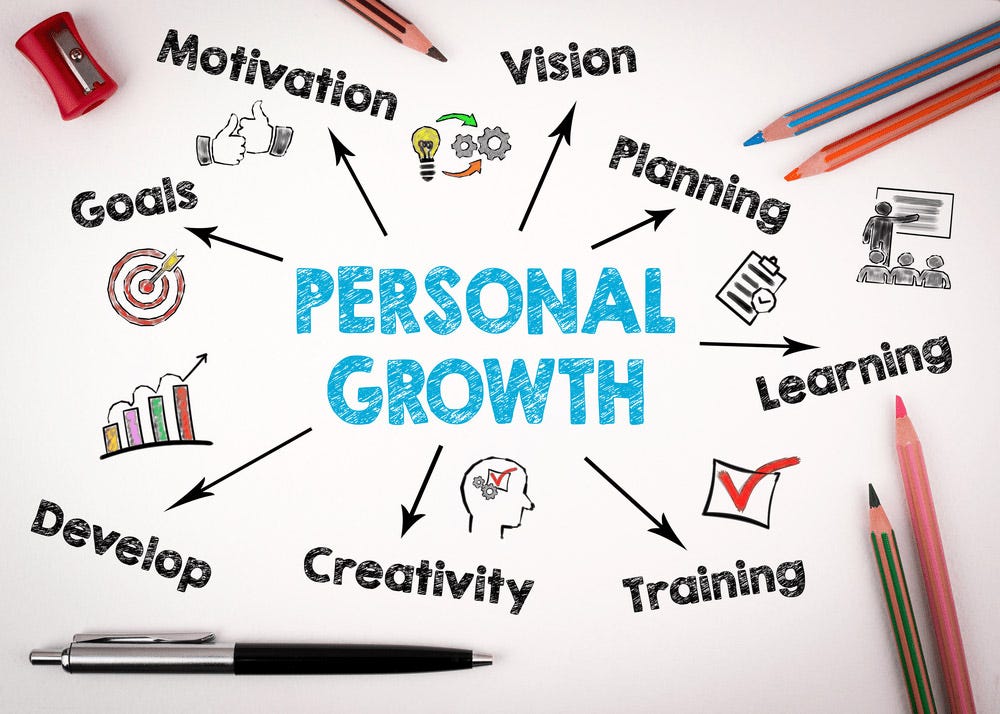
Personal development encompasses activities that improve awareness and identity, develop talents and potential, build human capital, and facilitate employability, enhance the quality of life, and contribute to the realization of dreams and aspirations. It is a lifelong process of nurturing, shaping, and maximizing your potential in various aspects of life.
1. Understanding Personal Development
What is Personal Development?
Personal development refers to the process of improving oneself through activities that enhance awareness, develop talents and potential, build human capital, and facilitate employability and quality of life.
Why is Personal Development Important?
Personal development is crucial because it:
Increases self-awareness: Helps identify strengths and weaknesses.
Improves motivation: Sets clear goals and objectives.
Builds resilience: Enhances coping skills and adaptability.
Improves quality of life: Leads to greater satisfaction and fulfillment.
2. Components of Personal Development
Emotional Intelligence
Emotional intelligence (EQ) involves understanding and managing emotions effectively, both in oneself and others, leading to improved relationships, better decision-making, and increased empathy.
Goal Setting
Effective goal setting involves setting SMART goals (Specific, Measurable, Achievable, Relevant, Time-bound), breaking them down into smaller tasks, and regularly reviewing progress to stay motivated and focused.
Time Management
Time management skills help prioritize tasks, allocate time effectively, and reduce stress. Techniques like the Eisenhower Matrix and Pomodoro Technique can enhance productivity and efficiency.
Communication Skills
Strong communication skills include active listening, clarity in expression, empathy, and non-verbal communication. Improving these skills fosters better relationships and collaboration.
Stress Management
Effective stress management involves techniques such as mindfulness, meditation, exercise, and time management to reduce stress levels and maintain well-being.
3. Strategies for Personal Growth
Self-Reflection
Regular self-reflection helps identify strengths, weaknesses, values, and goals. Techniques like journaling, meditation, and self-assessment tools promote self-awareness and personal growth.
Continuous Learning
Embrace lifelong learning through formal education, online courses, workshops, reading, and seeking mentors. Continuous learning expands knowledge, skills, and perspectives.
Building Resilience
Resilience involves adapting positively to adversity, setbacks, and challenges. Cultivate resilience through optimism, problem-solving skills, and seeking support from others.
Networking and Relationship Building
Developing and maintaining positive relationships fosters support, collaboration, and opportunities for growth. Networking events, social media platforms, and professional associations facilitate connections.
4. Overcoming Common Obstacles
Procrastination
Combat procrastination by breaking tasks into smaller steps, setting deadlines, eliminating distractions, and rewarding progress. Establishing a routine and prioritizing tasks can improve productivity.
Fear of Failure
Shift your mindset towards viewing failure as a learning opportunity. Embrace challenges, take calculated risks, and develop resilience to bounce back stronger from setbacks.
Lack of Motivation
Stay motivated by setting compelling goals, visualizing success, celebrating achievements, and seeking inspiration from role models or mentors. Regularly review progress to stay on track.
5. Implementing Personal Development Plans
Create a Personal Development Plan
Develop a personalized plan with specific goals, actions, and timelines. Consider your strengths, areas for improvement, and resources needed to achieve objectives effectively.
Monitor Progress
Track progress towards goals regularly, assess outcomes, and adjust strategies as needed. Celebrate milestones and use setbacks as opportunities for learning and growth.
Seek Feedback and Support
Seek feedback from mentors, peers, or coaches to gain insights, identify blind spots, and refine your personal development plan. Support from others enhances accountability and motivation.
6. Examples of Personal Development Goals
Career Development
Enhance professional skills, pursue certifications or advanced degrees, seek promotions or career changes, and cultivate leadership qualities.
Health and Well-being
Improve fitness levels, adopt healthy eating habits, manage stress effectively, prioritize sleep, and practice self-care routines.
Financial Management
Increase savings, reduce debt, create a budget, invest wisely, and develop financial literacy skills to achieve long-term financial security.
Personal Relationships
Strengthen communication skills, resolve conflicts constructively, nurture meaningful relationships, and spend quality time with loved ones.
Conclusion
Personal development is a continuous journey of self-discovery, growth, and improvement in various aspects of life. By understanding the importance of personal development, identifying key components, implementing effective strategies, overcoming obstacles, and setting meaningful goals, individuals can enhance self-awareness, achieve personal fulfillment, and lead a purposeful life.
This comprehensive guide provides a roadmap for individuals seeking to embark on or enhance their personal development journey. Embrace lifelong learning, cultivate resilience, and strive for continuous improvement to unlock your full potential and create a meaningful impact in your personal and professional life.


